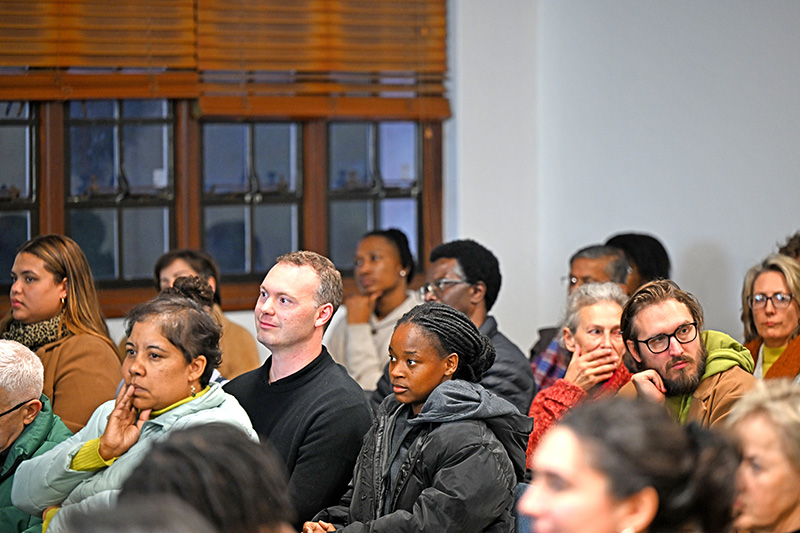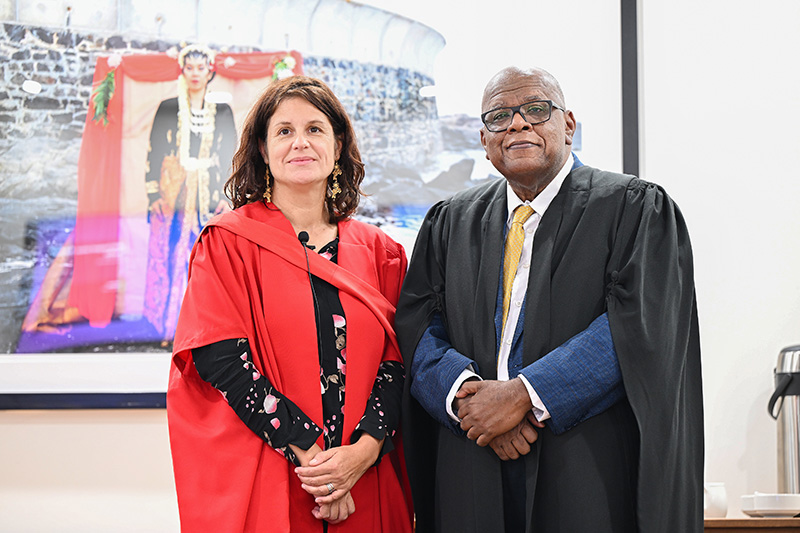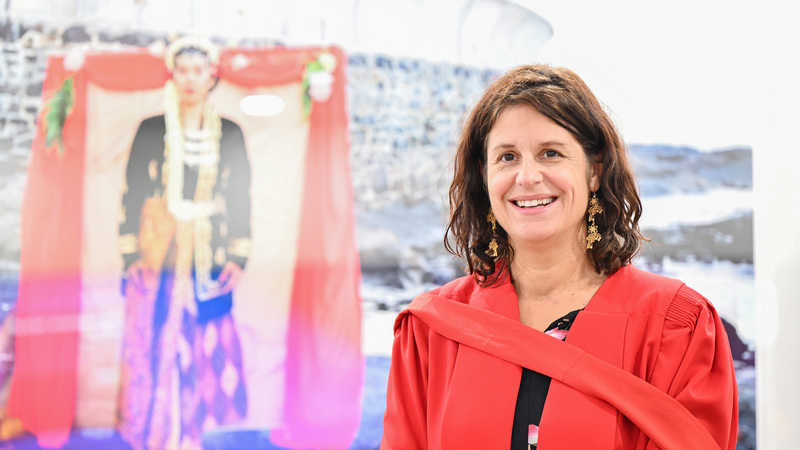Prof Ursula Hoadley’s inaugural – an ‘intellectual feast’
26 May 2025 | Story Niémah Davids. Photo Lerato Maduna. Read time 10 min.Brazilian educator and philosopher Paulo Freire once said: “Education either functions as an instrument to bring about conformity or freedom.”
According to Professor Elelwani Ramugondo, the University of Cape Town’s (UCT) deputy vice-chancellor for Transformation, Student Affairs and Social Responsiveness, Professor Ursula Hoadley’s career has been a profound call to choose freedom – in teaching and learning and striving for justice.
Professor Ramugondo made these opening remarks as she welcomed guests to Professor Hoadley’s inaugural lecture on Wednesday, 21 May. Hoadley is a scholar in curriculum studies in UCT’s School of Education. Her talk was titled: “Life in classrooms: Understanding interruption and enhancement through pedagogy”.
“Tonight, we are gathered to celebrate a [significant] moment in the academic journey of Professor Ursula Hoadley – a scholar who has spent nearly three decades immersed in the world of classrooms – working tirelessly to understand and illuminate the complexities of learning and teaching, particularly in contexts shaped by inequality and poverty,” Ramugondo said.
Two key ideas
To set the scene, Hoadley kicked off her lecture by highlighting two key ideas that have framed her work over the past three decades.
“We have for a long time been aware of the reproductive function of schooling; that an education a person receives is strongly tied to their social and economic circumstances. Schooling reproduces social inequalities and largely fails to provide enhanced life opportunities to those who need them most.”
“In education there have been numerous attempts to critique and counteract these ideas, and these are generally focused on the importance of teacher agency, student agency, identity and representation,” Hoadley said.
Another way of thinking about this is to focus on the second of her key ideas – education as the specialisation of consciousness. “Learning entails acquiring an abstracting orientation, a conceptual language to order our social worlds, to condense past understandings and open up possible futures, to challenge and transform present realities” Hoadley said.
A series of questions
She structured her lecture around a series of questions:
- What goes on in South African classrooms?
- How do classroom processes differ across different social contexts?
- Are there classrooms beating the odds?
- Are there programmes that can radically change classroom practices?
- Why do certain pedagogic forms persist?
“My talk is part a scholarly account of my research in schools. But it’s also a part personal story [highlighting] the journey I have taken into the sociology of education and the study of curriculum and pedagogy specifically. In preparing for this lecture, I was aware that every one of my projects, questions and ideas were shaped and sustained with others. I want to reflect the research endeavour as personal, communal and collaborative,” she said.
Observing Grade 1 classrooms
As part of her research into what goes on in the classroom during the early years of democracy, Hoadley and colleagues spent time in Grade 1 classrooms observing teachers and learners at schools in Khayelitsha. They witnessed that much time was spent on waiting, eating and singing, and oral discourses predominated in call and responses to low-level questions, or chanted rhymes by the whole class.
This collective chanting and call-and-response approach was a defining feature of the classrooms. She said the pedagogy did not provide learners with different ways of seeing their world other than what they experienced in their homes and communities.

“Not once during the long days of observations were learners exposed to or required to handle books. We saw two teachers read from the Bible. And [by] October around a quarter of the learners we observed couldn’t write their own names,” she said. “Here was stark evidence of a reproductive pedagogy that failed to provide learners with the means for organising their world in new ways.”
Different classroom processes
Hoadley said she knew that what they observed in Khayelitsha was very different to what was afoot in more affluent schools in Cape Town. This set the groundwork for her PhD. She selected a set of schools in Khayelitsha and Rondebosch and focused on how classroom processes differ across different social contexts.
The classrooms she chose were at opposite ends of the social class continuum and her intention was to put differences starkly on display. The idea, she explained, was to understand theoretically to what extent and in what way the pedagogy differed.
There were two key differences in pedagogy that stood out in the early grade maths and reading lessons. The first, Hoadley said, was the kind of knowledge that dominated the classrooms. In Khayelitsha, teachers circulated knowledge that learners were already familiar with, including their experiential understandings of things like rhymes and songs, which she described as everyday knowledge. However, at schools in Rondebosch, school knowledge, abstracted skills, general definitions and meaning dominated lessons.
The second key difference between the contexts was an individualising pedagogy in Rondebosch schools and what she has defined as a ‘communalising pedagogy’ in the Khayelitsha context, where “teachers work with the whole class as a homogeneous group, with little or no differentiation of tasks or differentiation of individual performances. In a communalising pedagogy, close scrutiny of what individual learners produce is not possible, and, consequently, the conditions for the successful production of the relevant pedagogic text are foreclosed”.
Who’s beating the odds?
Over the years, Hoadley spent a considerable amount of time in classrooms not conducive to learning. And she wanted to understand whether there were classrooms that were able to interrupt what seemed to be the grinding processes of social reproduction in classrooms. This, she said, brought her to her next large project, which included answering two very important questions: What was happening in schools and classrooms that were beating the odds? Were there schools in poor communities where teachers and their learners were managing to obtain good outcomes?
“Efforts to upskill teachers since the end of apartheid had been completely insufficient.”
Along with fellow researchers, they identified schools where they could explore these questions. And while they found some differences in management practices in outlying schools, the team found few differences in the pedagogies within and across schools. In addition, she said, researchers found more structure in lessons and subjects were clearly demarcated as a result of curriculum policy change. There was also a lot more text available in classrooms. However, the pace at which teachers taught remained slow, learners also spoke very little and asked few questions and a communalising pedagogy was dominant.
“Teachers lacked the subject knowledge and instructional expertise needed to teach reading and early maths. Efforts to upskill teachers since the end of apartheid had been completely insufficient and it was apparent that changes in curriculum alone could not produce a significant shift,” Hoadley said.
Interrupt, intervene, transform
As she concluded her lecture, Hoadley reminded the audience that she started off by touching on how education is fundamentally about the specialisation of consciousness and about developing an abstract orientation to making sense of the world.

Prof Ursula Hoadley and Prof Jonathan Jansen
“But how can communal activity in the classroom result in the development of these individual capacities? How do we attend to internal individual cognitive processes while maintaining regard for the collective or the affiliative social function of chorusing [and] call and response in the classroom?” she asked. “Can we find a calibration between a communal social form and individualised knowledge orientation and what might it look like?”
As she continues her research, she said she hopes to find ways of understanding the relation between the theory of the world and the experiential world itself and how to engender a sense of belonging to both, and establish the capacity to interrupt, intervene and transform those worlds.
Intellectual feast
In response to Hoadley’s lecture, Jonathan Jansen, a professor in education at Stellenbosch University, took to the podium to offer his take on her presentation. He described the lecture as an intellectual feast.
“It was absolutely wonderful listening to Ursula do such an amazing job,” he said.
To the audience, Professor Jansen added: “You’ve probably listened to one of the country’s finest education scholars share her thinking about one of the most intractable problems in education through her focus on what really happens inside classrooms.”
“May your star continue to rise as you break new ground in research that offers hope not only to South Africa but throughout the education world.”
He said Hoadley’s work brings intricate and thoughtful accounts of the routines, the rhythms and resonance that sustain what she refers to as communalising pedagogies in South African classrooms.
“Welcome to the class of full professors. May your star continue to rise as you break new ground in research that offers hope not only to South Africa but throughout the education world. And as we continue the search for a truly liberating pedagogy that transforms the lives and the learning of teachers and learners alike,” Jansen said.
 This work is licensed under a Creative Commons Attribution-NoDerivatives 4.0 International License.
This work is licensed under a Creative Commons Attribution-NoDerivatives 4.0 International License.
Please view the republishing articles page for more information.











